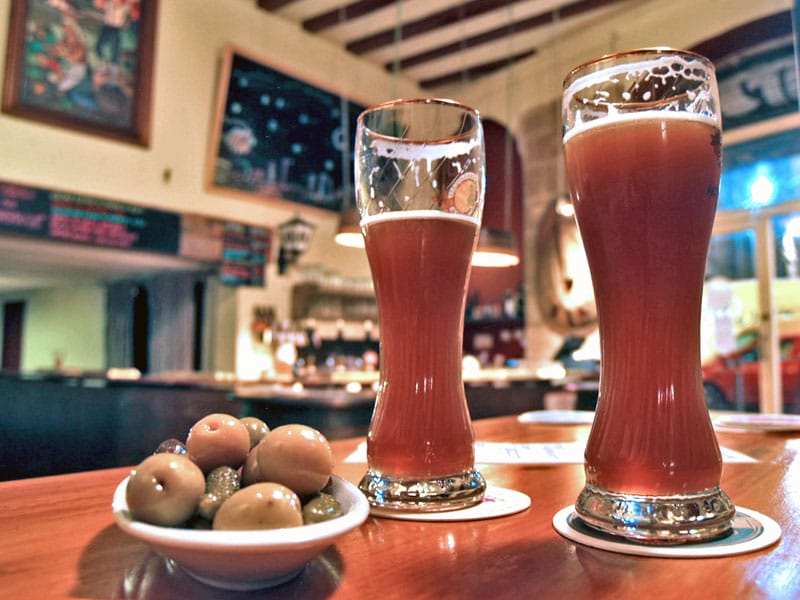Next to some wooden shelves overloaded with spirits, a photograph of Natália Correia hangs on the wall. The photo’s placement makes it appear as if Correia, cigarette in hand, is surveying the small room, which is crowded with semi-broken tables. The late poet and upstart co-founded this tiny bar/café a few decades ago, and her presence is still felt here and in the neighborhood more generally: A nearby street, with a spectacular view of the city, is also named after her.
 Botequím is one of Graça’s oldest bars, located on the ground floor of Vila Sousa, one of the worker apartment complexes built at the end of the 19th century. From the outside, the building, which is clad in green tiles, has all the hallmarks of prime historic real estate that appeals to the well-to-do Europeans who are increasingly buying property here. But inside, somehow, it maintains its original character and type of resident. The same could be said for the bar – for now.
Botequím is one of Graça’s oldest bars, located on the ground floor of Vila Sousa, one of the worker apartment complexes built at the end of the 19th century. From the outside, the building, which is clad in green tiles, has all the hallmarks of prime historic real estate that appeals to the well-to-do Europeans who are increasingly buying property here. But inside, somehow, it maintains its original character and type of resident. The same could be said for the bar – for now.
From the late 1960s onwards, Lisbon was expanding and more people were migrating to the city for work. Correia opened Botequím da Liberdade, as it was known at the time, in 1971 with her friends Isabel Meyrelles, Júlia Marenha and Helena Rosetta. As a poet, playwright and activist in the Socialist party before the 1974 Carnation Revolution, Correia was an avant-garde mind, a key protagonist of the Iberian feminist movement and a promoter of socialist female solidarity who brought the issue of abortion to the national political table. She was even prosecuted (unsuccessfully) for pornography after she compiled an anthology of erotic and satirical Portuguese poetry at the end of the decade. Botequím da Liberdade became a key meeting point: her cohorts and other prominent lefty intellectuals, including Angelina Vidal, Sophia de Mello Breyner Andresen and Florbela Espanca, all drank, laughed, cried and schemed here.
Despite the bar’s cramped setting, people tend to linger for hours.
After the poet died in 1993, the bar was closed, but a group of four friends reopened it in 2010, shortening the name to Botequím. They have tried to maintain its character – a discreet memorial to its previous life. The bar still has a dozen antique tables where, despite the somewhat rigid wooden seating and cramped setting, people – locals especially – tend to linger for hours. For this reason, forget finding a seat on a late weekend evening.

Botequím is an ideal place to have a strong drink (the bar menu is refreshingly diverse compared to other old establishments in the city, with an astonishingly large whiskey list) as well as to eat petiscos (the Portuguese term for tapas) for lunch or dinner – another appealing feature is that the kitchen serves food until late.
It is one of the few corners in Lisbon that offers up decently priced, ample salads, and the prego is mind-blowing – arriving in a scalding hot dish directly from the oven, this mega sandwich is completely covered with melted cheese and sauce, an invention that mixes the famed Porto sandwich francesinha and the typical steak sandwich found in most Lisbon tascas.
As more and more food and drink establishments in the city ape yuppie-gourmet aesthetics to appeal to Lisbon’s new visitors, we appreciate Botequím’s commitment to taste – and its strong sense of history.
Published on September 25, 2017
Related stories
October 30, 2012
AthensThere are places that have been around so long that they've become emblematic of a city’s entire eating culture. In Athens, Stani (meaning "sheepfold" or "barnyard," depending on your definition) is certainly one of them. It may have a rustic-sounding name, but this wonderful, old-fashioned dairy bar – in business since 1931 – is an…
January 20, 2022
NaplesThe requirements for a place to qualify as an authentic Neapolitan trattoria are simple: It must be tiny, intimate and quiet, with a small menu and a genuine atmosphere. In other words, it must be La Cantina Di Via Sapienza. This is not a trattoria with fake antiques strategically placed inside to draw tourists or…
March 14, 2013
BarcelonaEditor’s note: We regret to report that La Cerveteca has closed. Once a mostly beer-free country, Spain – traditionally a land of wine drinkers – has recently started to develop a taste for the sudsy beverage, and Catalonians seem to have been the main pioneers behind this growing trend. The number of local craft breweries…



















































































